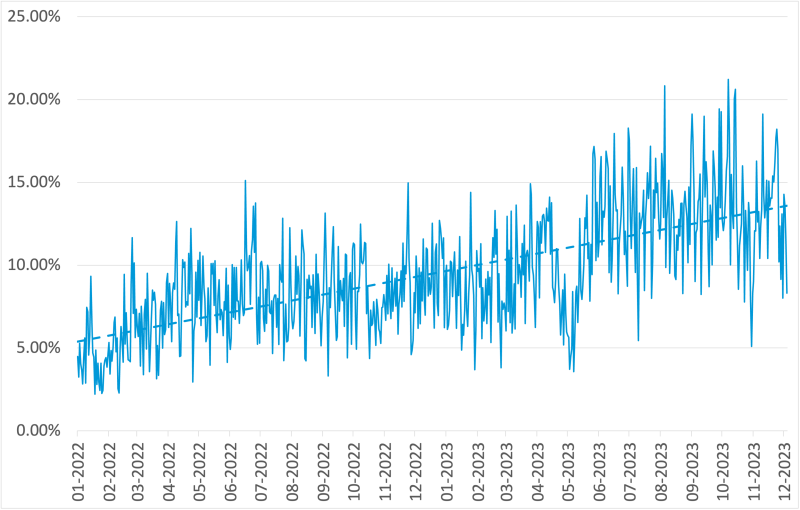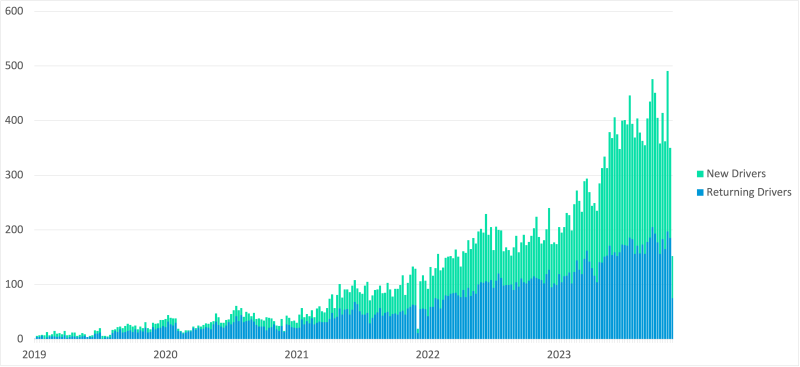In 1947, the iconic Roosevelt Hotel became the first hotel in the world to install televisions in guestrooms. The Roosevelt was at the forefront of a dynamic that has persisted in the hospitality industry: adapt to evolving guest needs or stagnate into irrelevance. Today, the Roosevelt is still going strong while many of its one-time competitors have faded into hotel history.
Like television in 1947 or Wi-Fi in recent decades, the explosive growth of electric vehicles is reshaping guest preferences, making EV charging an essential amenity for modern hotels. Insights from 68 hotels on the EV Connect network, coupled with compelling external studies, paint a clear picture: EV charging is not just about sustainability but about meeting and exceeding the expectations of today's travelers.
Guest Demand: A Rising Tide
A recent study by JD Power and Associates revealed that 19 percent of the nearly 4,000 hotel guests surveyed expressed the need for EV charging stations at hotels. This figure vastly surpasses the estimated one percent of EVs on the road, underscoring that EV drivers are significantly more likely to also be hotel patrons.
Further supporting this trend, data from Hilton Hotels indicates that Google searches for EV charging at their locations have dramatically increased, now ranking as the second-highest term in converting searches to stays. This leap in search term priority is compelling evidence that the availability of EV charging is becoming a critical factor in guests’ decision-making processes.
In what is good news for EV drivers, the 2022 Green Lodging survey by the American Hotel and Lodging Association, which includes 17,000 facilities, indicates that the pace of EV charger deployment in the hospitality sector is accelerating. This growth is particularly pronounced in full-service facilities, where six in 10 properties have charging stations, and in luxury hotels, where the figure is approaching 90 percent. Major hospitality brands are also publicly announcing their plans to add EV charging to their properties, like Marriott, which has announced plans to bring EV charging to thousands of locations in addition to the thousands of chargers the company has already deployed, and Hilton, which has made similar announcements. As such, the hospitality industry is visibly on board with EV charging.
The Data Speaks: Insights from Hotels
Clearly, many hotel brands and ownership groups believe that EV charging is an amenity worthy of investment. But what exactly can a hotel expect from putting EV chargers on their premises?
EV Connect benchmarked 22 months of data at 68 hotel properties on the EV Connect Network and found that the average utilization of hotel EV chargers stands at about 11 percent and is trending to 15 percent.

Utilization, a measure of charging asset productivity, is the percentage of time the charger is in use and potentially earning revenue for paid charging.
For hotels, a key metric to watch is the ‘session growth rate.’ Hotel sites often start small, with one to two charging sessions per charger daily. As properties, they market their chargers to guests and make them discoverable on public networks, and utilization quickly soars. The average session growth rate for hotels on our network is 64 percent annually, indicating a rapidly increasing demand for EV charging facilities.
Hotel charging is also a great way to get new guests through the door.

More than half of the hotel charging sessions analyzed were from new drivers, which is a strong indication of both rising EV adoption by hotel guests and that hotels are attracting guests to their properties as a result of the opportunity to charge their cars. Hotels, therefore, are no longer simply serving a niche market with EV charging, but they are using this amenity in response to a significant shift in guest preferences.
Moreover, hotels offering EV charging consistently report higher revenue per available room rates, which links the availability of EV charging directly with improved financial performance. The average annual revenue from paid charging at hotel sites on the EV Connect Network is $4,000, and the top 10 percent of these sites earn in excess of $10,000. However, the amount of charging revenue earned pales in comparison to the revenue protected by retaining the loyalty of EV-driving guests. With 10 percent of vehicles on the road expected to be EVs by 2030, EV charging is a guest amenity with tremendous opportunities for hotel differentiation.
Flexible Solutions
While the benefits are clear, deploying EV charging infrastructure can pose challenges that span from site design to staff training and integration with hotel business systems. Thankfully, managed charging solutions can significantly mitigate these challenges by offering seamless deployment and operations and moving quickly to enhance the guest experience.
Determining the optimal number and location of chargers is the first and most crucial step in the site design process. A benchmark suggests five to 10 percent of parking spots should be electrified, but local codes might mandate a higher number. An experienced contractor can help a hotel develop the optimal design for its unique location. Implementing a managed charging solution can also alleviate staff concerns. Features like a 24/7 call center, remote monitoring and comprehensive service plans ensure smooth operation without overburdening hotel staff.
Beyond this, managed charging solutions can help integrate EV charging into hotel loyalty programs, which will ultimately be a game-changer. Imagine guests earning points for charging their EVs or paying for the service with loyalty points. This integration will enhance the guest experience and deepen brand loyalty.
Looking Ahead: Data-Driven Strategies
As EV adoption continues to rise, hotels without charging facilities risk missing out on a growing segment of potential customers and diminished appeal with existing ones. The data visible from the charging network and trends from published industry studies provide a clear signal for the hospitality industry: embrace the reality that EV charging is a key amenity for success. Charging infrastructure is an investment in the near future and a commitment to meeting evolving guest needs. Hotels must embrace this amenity to stay relevant and keep a competitive advantage in retaining loyal customers and attracting a new segment of eco-conscious, tech-savvy travelers.
Ram Ambatipudi is the SVP of business development at EV Connect.
